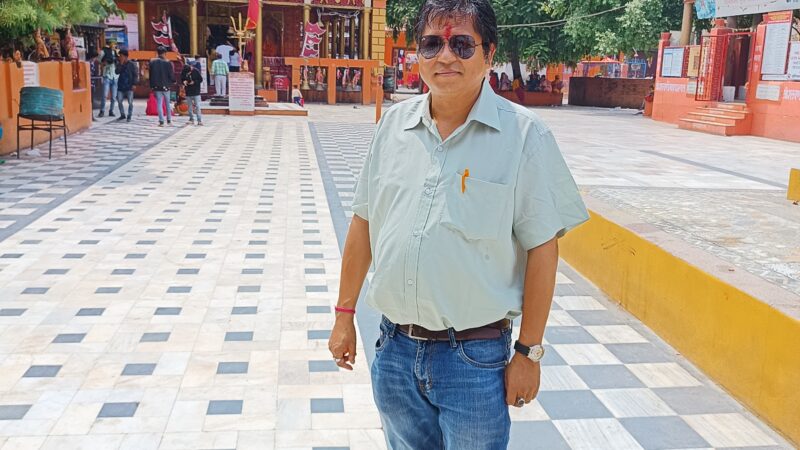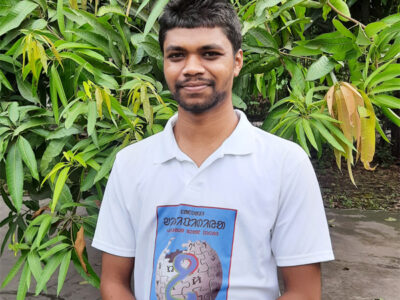
Image courtesy Bikram Rana
As part of our ongoing series highlighting the work of activists promoting Asian minority and regional languages in digital spaces, we would like to feature Bikram Rana (@your_bikram).
From Nepal, Bikram has been working to promote the language of Rana Tharu by writing articles and blogposts, creating a digital forum, and translating children's stories into Rana Tharu. The Rana Tharu are an ethnic subgroup of the Tharu people of southern Nepal.
Rising Voices spoke to Bikram over email about his work. An edited excerpt follows.
Rising Voices (RV): Please tell us about yourself and your language-related work.
Bikram Rana (BR): I was raised speaking Rana Tharu at home in Kanchanpur, Nepal. I was selected for Budhanilkantha school in Kathmandu from Kanchanpur district in 1984, since then I am out of my home district with sporadic monthly stay in my hometown. I developed a habit of collecting pieces on Rana Tharu to understand more about this minority community living in Kailali and Kanchanpur districts of Nepal and the adjoining border in India.
I founded the Rana Tharu Welfare Forum (RWF) and sporadically engage with Rana Tharu Samaj. One of the objectives of RWF is to write about the Rana Tharus targeting Tharu and Tharu groups so that people have better understanding about Rana Tharus and the language. Some of my work has been published as op-eds and blogs:
- Five misconceptions about Rana Tharus – The Record 19 May 2022
- OPED about Rana Tharu: “The Identity Battle” 15 May 2012.
- Targeting children, I also initiated translation of stories in Rana language, first from the Rana Tharu community to translate stories like this one in Rana Tharu in StoryWeaver.
Through Rana Tharu societies we have been also advocating for the Rana Tharu language to be considered for mother-tongue based multilingual education.
RV: What is the current state of your language both online and offline?
BR: The official working language of Nepal is Nepali but the 2015 constitution provisions each province to choose one or more additional official working languages. Through Rana Tharu organizations we have been lobbying for Rana Tharu as an additional official working language in Sudurpaschim (far west) province of Nepal. The Language Commission of Nepal, on September 6, 2021, recommended 14 official languages for the different provinces of Nepal. The commission recommended Dotyali and Tharu for Sudurpaschim — Rana Tharus in Kanchanpur and Kailali are not happy with this recommendation, since the Tharu language is different from Rana Tharu.
Mother-tongue based multilingual education captures Rana Tharu up to grade three in Kailali and Kanchanpur districts. However, the textbooks are only available up to grade two. Textbooks for grades one and two are also falling short. The implementation aspect of mother-tongue based multilingual education is realistic, but it seems to not endure because it is not a priority of the state to develop textbooks and build teacher capacity.
RV: What are your motivations for seeing your language present in digital spaces?
BR: Understanding languages is one of the important factors to claim an identity. It must be visible and attractive online if we want to have a chance to preserve our language, identity, and culture.
RV: Describe some of the challenges that prevent your language from being fully utilized online?
BR: There are few digital initiatives to promote Rana Tharu language use, one of the major challenges is the dominance of Nepali and English languages. The quality of writing in Rana Tharu is equally important; for this we need to revive the Rana Tharu script (Unam is known as the main script guiding Rana Tharu language; however it is not that easily available). The Rana Tharu script can be a push and pull factor to enlarge the use of the language.
RV: What concrete steps do you think can be taken to encourage younger people to begin learning their language or keep using their language?
BR: Mother-tongue based multilingual education in Rana Tharu Language is one way to encourage younger people to begin learning. Rana Tharu as an additional official language in Province 7 (Sudurpaschim province) will help to enlarge its use and development. Writing in Rana Tharu language will also help widen the use of the language.



